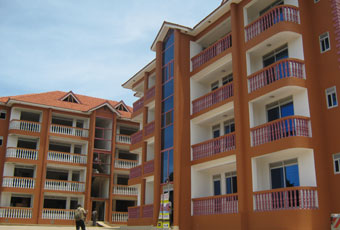
By Patrick Kagenda
House dealers targeted mainly Ugandans in the Diaspora and foreigners
After the boom years of 2006 and 2007, the real estate turn-key housing business is facing an unprecedented slump blamed on the global financial meltdown. However, sector experts point to a shift away from buying to renting and re-emergence of locals at the core customer.
Sector giants, Kensington have up to 84 houses in their 149 unit Najera estate on the outskirts of Kampala city unsold. Of the 37 two-bedroom homes, only eight have been taken up and are ready for occupancy, of the 61 three- bedroom homes, 33 have been booked, and of the 10 five-bedroom homes, eight have been snapped up . However, all the 41 four-bedroom homes remain unsold.
The Kensington General Manager Lynnete Chiromo will not discuss the full impact of global financial meltdown on business. She is new in office. But she admits it has had an effect.
Before the financial meltdown began taking its toll on the global economic order, real estate turnkey projects) was becoming a catchword in Uganda. House dealers targeted mainly Ugandans in the Diaspora and foreigners.
“Before the global financial meltdown struck, we used to put these homes on the net and the inquiries would be overwhelming, but today we are getting few inquiries,” saysSsegawa Ronald Gyagenda the managing director of Rona Holdings, a private real estate development entity with condominium houses in Ntinda. Rona has sold only four of its 16 apartments.
New private entrants in the Uganda real estate sector like Kensington, Royal Palm, and Rona Estates joined the traditional National Housing and Construction Company (now National Housing) and banks, including Housing Finance, DFCU and Stanbic Bank, scrambled to offer mortgage facilities.
The new entrants targeted Ugandans living in the Diaspora and the emerging middle-class with houses going for between US$80,000 and US$220,000.
Things have changed.
“Many people now want to rent rather than buy finished homes. When you tell a person a house costs $95,000 to buy and own they say that”™s a lot of money”¦Many have resorted to buying land in their villages and building there. They are not willing to go to banks and get mortgage financing,” says Ssegawa.
The recent stress of the shilling against the major world currencies has added to the woes of real estate dealers as most homes are priced in dollars. Only National Housing offers its homes in both the shilling and the dollar.
“When the crisis struck and the dollar appreciated against the shilling, it meant costs of houses were to go up yet our biggest buyers who are Ugandans living in the Diaspora had to cut on their spending as they were not sure of their stay on the jobs,” says Ssegawa, “Many of them lost their jobs and spending was minimised to the lowest level of only buying household necessities.”
At Housing Finance bank, David Dansor, the head of mortgage financing says although the financial meltdown affected demand for finished homes for sale and the market contracted as people developed fear leading to a drop in sales during the usually busy season in December, local business remained vibrant and clients who had taken mortgage financing continued paying.
“We never experienced any faulting on mortgage repayment,” he says.
Hentie Stemmet, the Head of Vehicle and Asset Financing at Stanbic Bank (under which Mortgage financing falls), agrees. He told The Independent that fortunately the prices of homes have not gone down.
“There was a shift in demand from acquiring a home to merely renting them. This is because the oil sector is attracting investors who need to stay in good environments. The demand for renting is now higher than that of buying to own,” he said.
Joseph Kitamirike, the Chief Executive at the re-branded National Housing says all is not lost. “With the world beginning to recover from the global financial meltdown, we hope people will pick interest in buying homes.”
 The Independent Uganda: You get the Truth we Pay the Price
The Independent Uganda: You get the Truth we Pay the Price


